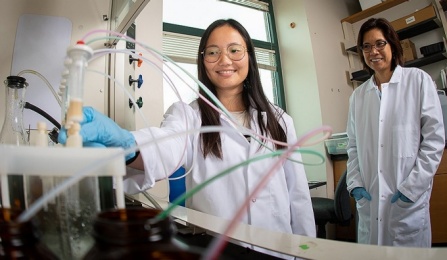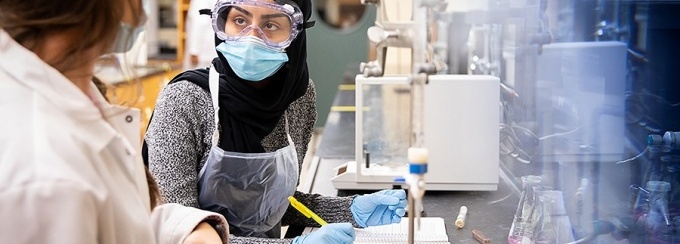Chemistry During COVID
Virtual PhD Defenses
Adapted from a UBNow article written by Charlotte Hsu

Chemistry's first Zoom defense with Luisa Angeles, PhD
All aspects of life in the Department of Chemistry were affected by COVID, including PhD defenses.
You enter the PhD defense as a student. You leave as a newly minted PhD. For Luisa Angeles in the Department of Chemistry, this milestone took place on Zoom. On the bright side, her parents and siblings in Asia got to attend, logging in at 1 a.m. in the Philippines. On a less cheerful note, the celebration afterward just wasn’t the same as it would have been in person, despite a virtual toast.
Angeles was the first student in the UB chemistry department to defend a PhD online during the pandemic, in April 2020. When she learned in March that she would need to defend virtually, “I really wanted to push through with it,” she says. “I thought it would be agony, waiting to see if the social distancing rules would change.” Since Angeles’ pioneering Zoom defense, 18 other PhD students have now successfully defended their dissertations on Zoom!
Some tips from Angeles on prepping for a virtual defense:
Practice — virtually! Angeles’ defense included a 45-minute presentation, followed by a Q&A. “I did a practice with other lab members via Zoom,” Angeles says. “I did the actual presentation, and afterward, they were asking questions. It made me comfortable doing the actual Zoom defense.”
Get familiar with the technology. Angeles says her department laid out some helpful recommendations for online defenses. Before the defense, Angeles and her adviser worked together to test functions like screen-sharing and breakout rooms for private conversations.
Dress up and find a quiet spot. “Try to dress up the same way you would dress up in a normal defense, and find a nice area in the house where it’s well-lit and quiet, where you would be able to focus,” Angeles says. Doing so gave her confidence and underscored the importance of the event.
Before the defense, “I was still nervous in the same way I was nervous if it was going to be in-person,” Angeles says. “I really appreciate the support of everyone that helped me because it’s really a difficult time to do a defense because there’s a lot of stress and anxiety.”
The many emotions of a virtual defense
Both Angeles and her adviser, chemistry professor Diana Aga, say the best part of the Zoom defense was that it allowed Angeles’ family in the Philippines to attend. This included Angeles’ parents, whose plans to travel to Buffalo were canceled due to the pandemic, and Angeles’ three siblings, who wouldn’t otherwise have been able to join.
“It was actually a bit emotional at the end when Luisa’s parents gave a congratulatory message to their daughter,” says Aga, Henry M. Woodburn Professor of Chemistry in the College of Arts and Sciences. “The parents were choking back tears when they spoke. Her younger sister, who is in college in the Philippines, also attended virtually. Incidentally, she is also a chemistry undergraduate student, so now she has a good idea of what to expect in a PhD defense.”
The defense brought people together in a special way. A faculty member who recently had a baby was able to attend without leaving home. A former graduate student who mentored Angeles logged in from Luxembourg, where he’s doing postdoctoral research.
Somehow, though, the worst part about defending on Zoom was not being able to truly celebrate together, Aga and Angeles say.
Before the pandemic, Aga’s team would mark a successful defense with a series of traditions. Friends and colleagues would gather, and the student who just defended would add their name to the door of a laboratory freezer holding the signatures of a long line of past graduates. Though Angeles was able to sign in early May, when she stopped by campus to return keys to Aga, the ritual was a quiet one. Only Angeles, her husband and Aga were present.
“It’s just happier, more fun, when you’re all together,” Angeles says. “Usually after the defense, we would share food and celebrate together. Just being together after a happy event, I think. That’s what I missed.”
Instead, following Angeles’ defense, participants gave a virtual toast. Together, but also apart, they raised a glass on Zoom. From the U.S., from the Philippines, from Luxembourg, they cheered Angeles on and wished her well in the next phase of her life.
Revamped Safety Practices Allow Students to Gain Lab Experience
Adapted from a UBNow article written by Marcene Robinson and Cory Nealon

Instructional Laboratories during COVID
Throughout the 2020-2021 academic year, undergraduate laboratory courses in Chemistry, and labs and clinical courses across the university, were taught in a hybrid format with a mixture of in-person and remote experiences. In Chemistry, the tireless work of faculty, staff, and teaching assistants made this modified form of instruction possible. The following overview, adapted from a UBNow article from fall 2020, highlights our general chemistry program and the efforts of Rachel Ventura, PhD, Director of our General Chemistry Laboratory, in particular.
UB has answered a series of challenges this year to safely deliver a quality learning and campus experience to students amidst the COVID-19 pandemic. Among those successes: providing in-person lab and clinical courses to thousands of UB students.
Labs are the foundation of many programs and majors, providing an environment where students learn the fundamentals of research, as well as basic skills of science, that they later put into practice in the workplace. From gross anatomy courses to the School of Law’s Clinical Legal Education program where students practice under supervising attorneys, UB students are gaining professional experience under health guidelines for clinical and practical experiences implemented by the university in conjunction with the Erie County Department of Health.
“Lab and clinical work is fundamental to the education and professional development of thousands of students here at UB. We’re providing this necessary in-person instruction, while ensuring the health and safety of students and employees, because it’s part of our educational mission as a leading public research university,” says Graham Hammill, vice provost for academic affairs and dean of the Graduate School.
In adherence to UB’s health and safety guidelines, all programs require students to wear masks, socially distance, frequently wash their hands, and sanitize equipment and furniture after use. To allow students to properly social distance, most programs have opened additional sessions for enrollment and made extra classrooms available for use. Several labs and clinical courses will be completed prior to Thanksgiving break.
Students enrolled in lab-intensive programs in the College of Arts and Sciences have found success with a blend of in-person and remote learning. The Department of Chemistry, for example, is providing multiple sections of four general chemistry labs (100-level courses) to roughly 1,560 students who meet in person every other week. Students learn remotely during off weeks. Another 715 students are fully remote.
These courses have also employed a new lab platform that allows a seamless transition between in-person and virtual learning. This approach has enabled the department to reduce the number of students in labs by at least 50%, says Rachel Ventura, Director of the General Chemistry Laboratory. Other safety measures include physically distanced workstations, requiring all assignments to be submitted online instead of by paper, and holding office hours through videoconferencing.